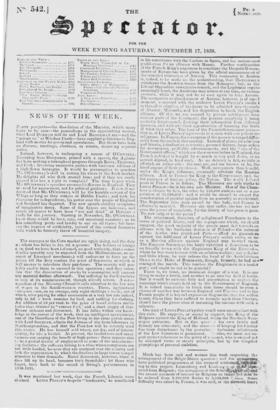The averages at the Corn-market are again rising, and the
duty 0 wheat has fallen to 18s. 8d. a quarter. The hidden' of foreigo c en, (and we have been itifermed, on good authority, that a cowl- denoble quantity may be expected from the Mediterranean, on ac- count of Liverpool merchants,) will endeavour to force up the Flees till the duty reaches the point of depression at which it will answer to introduce their purehases. The scarcity will pro- bebly enable them to succeed in this operation ; and they calcu- late that the diminution of stocks by consumption will revent any material decline afterward:. The suffering by the Corn-laws is only at its commencement, though already severe. A corre- spondent of the Morning Chronic:e calls attention to the low rate of wages in the South-western counties. There, agricultural lithourers earn, on an average, only eight shillings a weak ; out of which, after paying for other necessaries at a very low rate indeed, only 58. ad. a week remains for food, and nothing for clothing. An addition of 50 per cent, to the price of bread reduces multi- tudes thus situated to "coarser food,- and a short supply of that. Bence sickness and discontent. It has falleit within our know- ledge in the course of the week, that an intelligent agriculturist, one of the Guardians of the Poor living in the same perish union with Lord SPENCER, admits the distress of the farm-labourers in Northeminonshire, and that the Poor-law will be severely tried this winter. He has himself sold wheat, not dry, and of inferior quality, for 82e. a bushel. At present, the landowners and many farmers are reaping the benefit of high prices : there appears also te be a initial revival of employment in some of the manufactur- ing districts : the sufferers belong to a class whose complaints are too little heeded, because they are scattered over the country and leek the organization by which the dwellers in large towns compel attention to their demands. Rural discontent, however, when it does lilt up its head, becomes truly formidable: let those who forget, turn back to the record of Swing's perlormances in 1830-1931.


























